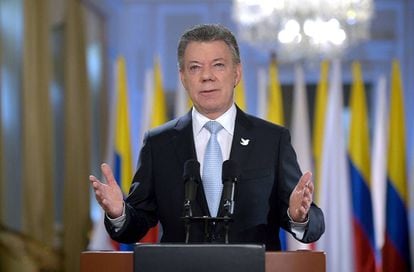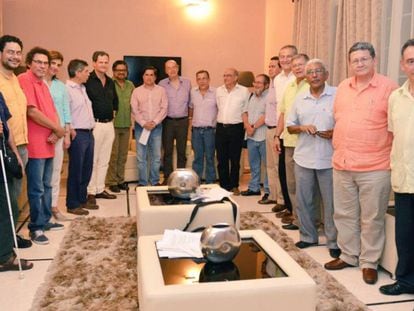Colombia, at peace
The end of negotiations with the FARC is a success for the entire region

On Wednesday, Latin America experienced a truly historic moment with the announcement that talks between the Colombian government and the leftist rebels of the FARC had successfully concluded, bringing to an end a 52-year civil war – the longest in the Western hemisphere – that has left at least 220,000 people dead, with another 45,000 missing and up to five million displaced. The end of this tragedy is an unqualified success both for Colombia and the international community, which has accompanied the process begun four years ago with the signing of an agreement that laid out the basis for talks that officially began on September 4, 2012.
Credit lies first and foremost with Colombia’s President Juan Manuel Santos, who, in his capacity as defense minister, delivered one of the toughest blows to the FARC when troops staged a spectacular jungle rescue of presidential candidate Ingrid Betancourt in 2008.
The Colombian government will have to explain in detail just what has been agreed in Havana
After taking office in 2010, President Santos committed himself to a peaceful, negotiated settlement to what seemed like an irresoluble situation. His decision brought him into conflict with many influential and powerful people in Colombia, among them his predecessor, Manuel Uribe. His initial strategy to continue fighting the FARC at home as though talks were not underway in Havana, and to negotiate in the Cuban capital as though there were no conflict underway in Colombia, proved to be correct. Furthermore, Santos has succeeded in keeping the international community involved in the talks at all times, making it clear that achieving peace is a collective effort involving all democracies.
Credit should also go to the FARC’s leaders, who have finally accepted that there was no way they could win their armed campaign and that the best way forward was to accept joining the democratic process, even if this meant laying down their arms. Over the last four years there have been setbacks, and both sides should be praised for not throwing in the towel and sticking with the only serious and lasting effort to reach peace in Colombia so far.
The end of this tragedy is an unqualified success both for Colombia and the international community
Needless to say, the agreement is not to everybody’s satisfaction, and many in Colombia consider that it doesn’t go far enough. As the government’s chief negotiator Humberto de la Calle noted earlier this week when the end to talks was announced: “We would all probably have liked more, but the agreement we have reached is viable, it is the best agreement we could have reached.”
The Colombian electorate will need to bear these words in mind when they vote in September in a referendum on the peace deal. Before then, however, the government will have to explain in detail just what has been agreed in Havana.
Dialogue has achieved the seemingly impossible. We must thank Colombia for this, and hope that reconciliation will now help the country turn a page on one of the darkest chapters in its history and allow it to look to a peaceful future.
English version by Nick Lyne.












































